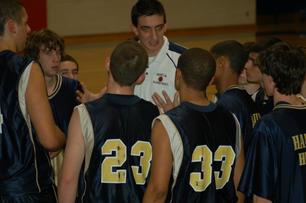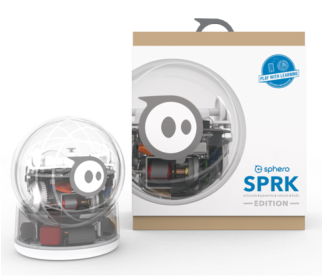 Throughout college, I worked as a sales associate at a popular big-box electronics store. The company had a unique compensation model for the industry. They paid a higher than normal hourly wage but they did not give commission in any form; no bonuses, no percentage of accessories, no SPIFF for adding on an installation service or warranty...nothing. They simply expected their employees to be highly educated on the products and services they were selling, and they expected us to share that information in a non-threatening, non-pushy way with customers. It made for a great working and shopping environment. The job was fun and the lack of pressure to sell add-ons (they didn't even track individual sales in any way) was a welcomed change from other retail positions I had held previously.
0 Comments
 After my 4th year in the classroom as a science teacher, I switched from a very small, private Christian school, to a large traditional public school. Not only did I drastically change educational environments, I also switched from science to math — the subject area I was officially qualified to teach. In the transitional summer, it was explained that I had to attend a week-long PD session in order to teach Algebra. In my prior school, we did not have the resources to deliver PD, so this would be my first PD experience. I was actually pretty excited because it had been almost a decade since my last math course and I was eager to brush up on my math and hone my skills so that I could be a highly effective teacher.  I was recently reflecting on my time as a science teacher at Hamilton Heights Christian Academy in Chattanooga, TN. It was my first “real job.” It was my first position in a career field that I loved. I was teaching groups of teenagers about science, but I knew I was also teaching them about life. It was a chance to open their eyes. It was enthralling to watch a boy grow into a man. It was unbelievably fulfilling to prompt a teenage girl with questions until she realized her real potential. It was exciting to learn new material and to experiment with instructional strategies, classroom management techniques, and assessment ideas I had only previously read about.  One of the biggest hurdles I see in education reform is that of handcuffed leadership. When managers, administrators, and teachers are overly restricted, creativity is squashed and the monster of apathy begins to grow. When an organization promotes a talented, zealous, competent employee to a leadership position, they must ensure that she is given enough freedom to actually take advantage of her talents. Far too often in education, the trend is to inadvertently stymie legitimate potential for improvement through restrictive legislation, overly litigated collective bargaining agreements, fear of punishment, excessive red tape, and/or disproportionate workloads.  I was recently honored to speak at the Computer Science Ed Week kick-off event that brought together 100 CS teachers from across the county in Boston, MA. For my portion of the program, I was asked to share ways to use Sphero™ brand toys/robots in high school CS. Just three weeks prior, I had purchased two of Sphero SPRKs™ for my 6 and 3 year-old daughters for Christmas. I was introduced to Sphero™ brand toys in the fall of 2014 when I won a grant to purchase robotics equipment for a high school. The relatively large grant was intended to purchase the human social robot, Nao™ but I had about $2,500 left over that had to be spent on robotics. After some research, I decided to give Spheros™ a try, purchasing about 20 balls and 6 Ollies™. Education is filled with teachers who make tremendous financial, social, and personal sacrifices because of their passion for education. While I have championed efforts to reconsider teacher pay and evaluations, I have never been bitter. I wittingly chose to become a teacher in spite of sacrifices I knew I would have to make for my family -- and in my experience, the overwhelming majority of teachers have done the same. Does it get old living paycheck-to-paycheck or breaking a backpack because of the number of books and papers you have to drag home to grade after you leave? Sure. There are days when a parent drives you crazy as she enables her son to continue to not reach his potential while she offers up excuse after excuse for him. Inevitably, at some point, you know you will get chewed out by an administrator for insufficient test scores -- even though you know that you're really getting it because the administrator got it from her boss and so on. It's unfair to do work that is often trivialized, discounted, underfunded, undervalued, lacks professional clout, pigeon holes, isolates, lacks external incentives, is clogged with bureaucracy, garners everyone's opinion, and is tiring.
 "You know, sometimes all you need is twenty seconds of insane courage. Just literally twenty seconds of just embarrassing bravery. And I promise you, something great will come of it." -- Benjamin Mee, We Bought a Zoo Life is scary. From grade school to retirement we are constantly thrust into a culture of comparison. Whether statistical stratification that comes from standardized testing ("I'm in the top 18% of my age group nationwide"), or job performance evaluations that identify whether or not we qualify for a management track, we are constantly being compared to other people. If we are not careful, we begin to invest in this comparative stock. If that happens, most of us start playing the game of life not to lose instead of playing to win. We maintain status quo to avoid being on the bottom, rather than innovating to try and rise to the top. |
Michael StoneClick here to read about the blog's author. My BooksKeynotesCleveland Rotary Club
Innovating Education Through Community Partners NEA Foundation The Promise of Public Ed Leveraging Teacher Leadership to Increase STEM Education US Senate Briefing The Need for a National Organizing Body of Digital Fabrication NACCE California Symposium Scaling Innovation through Partnerships Volkswagen eLab Ribbon Cutting Why Digital Fabrication can't be an Option NSTA STEM Leadership Developing, Incubating, and Implementing Public/Private Partnerships that Matter Chattanooga Fab Institute Revolutionizing Learning through Digital Fabrication HCDE Future Ready Institute Launch Developing PBL Units with Business Partners STEM Fellows Celebration Community Partnerships for Teacher Leadership TSIN Summit Scaling Innovation in Schools Remake Learning Days Dig Fab in the Community America Achieves Public/Private Partnerships Panel DigiFabCon Chicago Digital Fabrication in the Modern Classroom Redesign for Student Success (San Diego) Scaling Innovation through Digital Fabrication GE Leadership Summit Leveraging Innovative Technologies for Learning Texas Open Innovation Emerging Innovations in Education Indiana University Authentic PBL FFT Leading & Learning Boston, MA Connecting Global Ed reMake Education Summit Keynote National Governor's Asc. Coding with Governors US Dept of Education Round Table with Secretary John King TSIN Summit K-12 Pathways for CS Google Headquarters Ed Foo NASA Headquarters K-12 Education Panel White House Reducing the Racial Gap in Computing Boston Museum of Science Teaching with Toys US Dept of Education MSP CS Proposition Archives
October 2018
|


